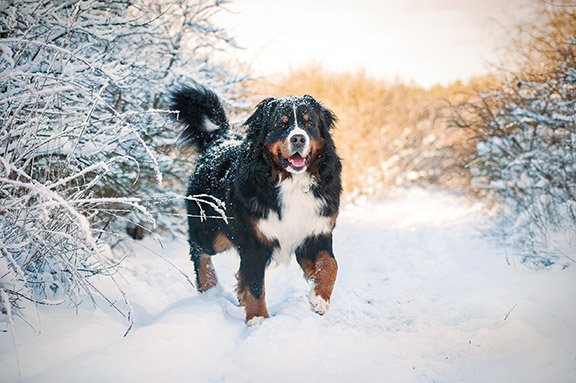Summer Health Tips
- Heatstroke: Always provide easy access to shade and fresh water. Avoid strenuous exercise during the hottest hours.
- Paw Care: Be mindful of hot surfaces like asphalt that can burn your pet’s paws. Early morning or late evening walks are safer.
- Hydration and Cooling: Ensure constant access to fresh water. Cooling mats and pet-safe sunscreens can also be beneficial.
Winter Health Considerations
- Exposure to Cold: Protect your pets from extreme cold. Short-haired breeds may need coats or sweaters. Exposure to freezing rain can lead to frost-bite. Most pets can tolerate the cold as long as they have been acclimated to the cold gradually. When pets spend most of their time indoors, they need time to adapt to extreme cold. Limit outdoor time to potty breaks, during severe cold spells.
- Indoor Winter Hazards: Watch out for indoor hazards like space heaters and wood burning stoves. Ensure that every pet has a warm, comfortable place to sleep, but note if they are gluing themselves to the registers or fireplace – being cold all the time can indicate an older pet is suffering from thyroid or kidney disorders.
- Skin and Coat Care: Dry indoor air can dry your pet’s skin. Consult your veterinarian for the ideal bathing and moisturizing products, compatible with your pet’s parasite preventives. Be sure to maintain a regular grooming schedule.
Spring and Fall Care
- Allergies: Pets can suffer from seasonal allergies. Symptoms can include itchy skin, ear infections, or respiratory issues. Consult your vet for appropriate allergy management.
- Parasite Surge: The increase in tick and flea exposure during cooler temps can lead to higher exposure to Vector-borne illnesses. These diseases include Lyme disease, Anaplasma, Babesia, Bartonella and Ehrlichia, Ensure year-round preventive treatments and don’t stop giving preventives when the weather cools down.
Dental Health: A Vital Year-Round Aspect of Health Maintenance
- Regular Dental Check-Ups – Often recommended in February, Dental Health Month
Poor dental health can lead to significant systemic issues, including heart, kidney, liver and other internal organ damage. Regular dental exams and cleanings are crucial. Learn the signs of dental disease and consider daily tooth brushing. - Home Dental Care
Implement a home dental care routine, including tooth brushing, dental chews, and toys designed to clean teeth. Ask your veterinarian if your pet can be fed raw bones for a natural source of minerals and a natural toothbrush. Many, but not all, of Dr. Maro’s patients maintain dental health with raw bones.
Grooming: More Than Just Aesthetics
• Routine Grooming
Regular grooming is essential for all pets, not just those with long hair. It helps detect skin issues, parasites, or abnormal skin growths in their early stages.
Maintaining ideal toe nail length from an early age is important to joint and musculoskeletal health.
• Seasonal Grooming Tips
Adjust your grooming routine based on the season. For instance, more frequent brushing during shedding seasons and increased attention to paw care during winter months when ice melt products can damage the pads are vital to health maintenance. Paw protection with topical pad ointments and boots for pets’ walks are great additions to your pet’s care.
Preventing Boredom and Premature Aging – Mental and Emotional Well-being
• Mental Stimulation
Pets require mental stimulation to prevent boredom and related behavioral issues. Provide toys, training sessions, and interactive playtime. When the rain and cold weather prevent outdoor time, be sure to provide indoor mental and physical stimulation through addition of “brain games”.
• Emotional Health
Pets experience both their own and their humans’ stress and anxiety. Maintain a stable human interactive environment, address your own mental and emotional challenges through therapy, yoga and relaxation techniques. For pets who experience stress, use behavioral conditioning training and consider pheromone diffusers and other calming supplements. For treatment of sever anxiety in pets, consult your vet who can prescribe medical therapy when needed.
The Importance of Exercise and Play Through All Seasons
• Regular Exercise
Exercise is critical for maintaining your pet’s physical health and preventing obesity. Tailor the type and amount of exercise to your pet’s breed, age, and physical condition. And when your pet cannot be active, remember to reduce the food and treats.
• Playtime
Interactive play helps with physical fitness and mental stimulation while strengthening the bond between you and your pet. Use a variety of toys and games to keep playtime interesting and engaging, even when you’re indoors during the colder months.
Tailored Healthcare: Special Considerations for Different Breeds and Ages
• Breed-Specific Needs
Some breeds are predisposed to certain health conditions. Developing an understanding and awareness of these can guide preventative care strategies.
• Life Stage Care
Pets’ dietary and exercise needs change as they age. Puppies and kittens require more supervision and interactions compared to adult and senior pets. During cold weather, young pets may demand more attention and creativity to keep them from destructive behaviors. Please ask you vet during regular visits how you can help your pet maintain good quality of life, while addressing their age-related challenges.
Your pet’s veterinarian is your partner for navigating the special requirements that changing seasons of the year and the changing seasons of life bring. Ask them to help you prevent or correct any pet health problems that develop with seasonal and weather challenges.
Remember, your veterinarian is your partner in your pet’s health care journey. Regularly consulting and following their expert advice will help you to provide the best care for your beloved companion.
Author
Dr. Cynthia Maro – Integrative Veterinarian, Cynthia Maro, DVM, CVA, CAC, VMRT, VNAET
